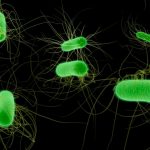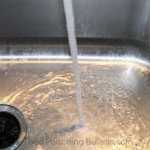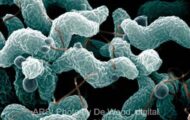The New Hampshire Department of Health and Human Services (DHHS) is recommending that anyone who has purchased Poland Spring 3- or 5- gallon water bottles check them for gasoline odors before using. Clean water should not have any type of chemical smell; it is odorless. After Hurricane Sandy, when gasoline shortages were reported in New York, New Jersey, and Connecticut, some people used large water bottles to hold gasoline. Bottled water companies have since detected returned and recycled water bottles with gasoline residue and fumes. The companies have measures in place to remove those bottles from reuse, but a "very small number" of contaminated bottles did make it through the detection process. Those levels of gasoline are "not likely to result in long-term health effects" … [Read more...]
E. coli Found in Kingston, GA and Horn Lake, MS Drinking Water
The bacteria E. coli has been found in the drinking water of the city of Kingston, Georgia, according to CBS Atlanta. In addition, E. coli bacteria was found in the water supply in Horn Lake, Mississippi, according to wmctv.com. There is no information about this problem posted on either city's web site, but boil water notices have been issued, and officials in Kingston did not get back to us by press time. E. coli bacteria can cause serious and life threatening infections. Complications of this infection include hemolytic uremic syndrome (HUS), which can cause kidney failure and death. Billy Baker, who runs the Kingston water department, told the Daily Tribune News that the city has shut down the well and began to use another one. Apparently, heavy rain caused flooding that … [Read more...]
Erin Brockovich Chemical Still in California Drinking Water, NRDC Files Suit
It’s been more than 10 years since Julia Roberts made Erin Brockovich a household name. But the cause that made Brockovich famous is still making headlines. In a lawsuit filed against the California Department of Public Health (CDPH) yesterday, the Natural Resources Defense Council (NRDC) and the Environmental Working Group say the agency has failed to protect Californians from hexavalent chromium in drinking water. Brockovich proved industrial pollution contaminated drinking water sickening residents of Hinkley, California during the 1990s. CDPH was supposed to have established a safe drinking water standard for hexavalent chromium eight years ago, but hasn’t done so, the NRDC says. “Millions of Californians are drinking toxic water today due to government neglect,” Nicholas Morales, … [Read more...]
CDC Releases Study of Lead in Drinking Water
The CDC has released a study titled "Lead in Drinking Water and Human Blood Lead Levels in the United States" in its Morbidity and Mortality Weekly Report. The report, dated August 10, 2012, reviews publications on childhood lead poisoning, sources of lead exposure for adults and children, and the Safe Drinking Water Act Lead and Copper Rule (LCR) of 1991. Tap water as a source of lead exposure is the focus of the report. Lead is a common metal that accumulates in the body with disastrous results. In the 1970s, the United States government started to reduce lead concentrations in air, tap water, food, dust, and soil. As a result, blood lead levels (BLLs) in children have been substantially reduced. But children are still being exposed to lead, since many live in housing built before the … [Read more...]
Portland Area Boil-Water Advisory Ends
The boil-water advisory has been lifted for people who live and work west of the Willamette River and have Portland city water. On Saturday, July 21, 2012, Portland's water bureau issued a ‘Boil Water Notice’ after a second test was positive for bacterial contamination in Reservoir 3 inWashington Park. An investigation into the source of the contamination is ongoing. In addition to those living west of the Willamette River, customers in the Burlington Water District, Valley View Water District, Palatine Hills Water District, Lake Grove Water District, West Slope Water District and the City of Tigard were also affected. Customers in those areas were under the boil-water advisory for about 24 hours. In 2009, fecal contamination from a bird source caused a similar situation. During a … [Read more...]
Lake Superior Beaches Closed for E. coli Contamination
The Minnesota Department of Health has recommended No Contact with the water at several beaches along the shore of Lake Superior. The beaches are monitored on Mondays every week during the summer months. The DOH announced today that 42nd Avenue East Beach and Brighton Beach in East Duluth both have high levels of E. coli bacteria. In addition, Minnesota Point 15th Street Harbor Side Beach, Park Point 20th Street/Hearding Island Canal Beach, Park Point Sky Harbor Parking Lot Beach, have high levels of bacteria. That area recently had severe flooding from heavy summer rains, causing millions of dollars worth of damage. Flooding can wash bacteria from sewage systems into lakes, rivers, and streams. Do not swim in the water at these beaches. People have contracted bacterial infections from … [Read more...]
E.coli In Aberdeen SD Drinking Water Prompts Boil Water Advisory
E.coli levels in the drinking water supply for the city of Aberdeen, SD have reached dangerous levels, prompting city officials to issue a boil water advisory. Aberdeen residents should not drink tap water without boiling it first. Before it is safe to drink, the water needs to boil for a full minute. "Boiled or bottled water should be used for drinking, making ice, brushing teeth, washing dishes, and food preparation until further notice," the advisory states. Boiling kills E.coli and other dangerous bacteria that cause serious, sometimes life-threatening illness. Most at risk are small children, the elderly, pregnant women and those with weakened immune systems. Symptoms of an E.coli infection include abdominal cramps, diarrhea that is sometimes bloody, nausea and headaches. … [Read more...]
Today is World Water Day
Today is World Water Day. The availability of clean potable water is diminishing around the globe. In fact, the Water Resources Group says that without more efficiencies put in place, by 2030 the demand for water worldwide will exceed availability by 40%. Competition for water around the world may fuel instability in the next decade, especially in areas such as the Middle East and Southeast Asia, according to a U.S. intelligence report. In the United States, a recent study found that 10% of people living in California's rural areas have drinking water contaminated with nitrates. Another study found that outbreaks of E. coli are common through contaminated freshwater. Agriculture is the largest consumer of fresh water. Many studies have shown that producing meat takes an … [Read more...]
One-Tenth Of Rural Californians Face Drinking Water Risk
Nitrate contamination in drinking water poses a health risk for one tenth of rural Californians, according to a new study by researchers at the University of California- Davis. Released during National Groundwater Awareness Week, the report, entitled “Addressing Nitrate in California’s Drinking Water,” and commissioned by the California State Water Resources Control Board, is the first comprehensive investigation of nitrate contamination in the Tulare Lake Basin, which includes Fresno, Bakersfield, and the Salinas Valley. Nitrogen in organic and synthetic fertilizers has increased crop production in California, but excess nitrate in groundwater from surface nitrogen poses serious health risks and has been linked to thyroid illnesses, some cancers and reproductive problems, … [Read more...]
E. coli and Other Fecal Bugs Cause 71% of Water-Associated Outbreaks
Seventy-one percent of the world's water-associated disease outbreaks reported between 1990 and 2008 were water-borne diseases caused by micro-organisms like E. coli that enter water through fecal contamination and cause infection when humans consume contaminated water. That was a major finding in a newly published study conducted by Ohio State University scientists who constructed a massive database containing information about 1,428 water-associated disease outbreaks. They used the model to predict that western Europe, Central Africa and Northern India are at higher risk for water-borne diseases, especially diarrhea and other complications from E. coli, and that the risk in Europe is primarily driven by water-carried diseases that tend to occur in recreational areas. Based … [Read more...]







